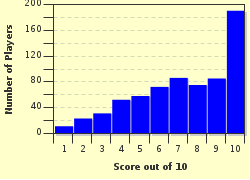Quiz Answer Key and Fun Facts
1. At number ten is a poem entitled "To the Virgins, to Make Much of Time". This was written by an Englishman who died in 1674 at the age of 83. Who was this poet?
2. At number nine is the poem "La Belle Dame sans Merci", by John Keats. What is unusual about this poem?
3. At number eight is Matthew Arnold's "Dover Beach". In which country is this beach which Arnold made famous by his wonderful poem?
4. Weighing in at number seven is "Kubla Khan", which begins with the familiar lines, "In Xanadu did Kubla Khan, A stately pleasure-dome decree." Who is the author of this poem, a poet who also wrote "The Rime of the Ancient Mariner"?
5. The great Robert Frost wrote many beloved poems, but the one which made the top ten, at number six, was his "Stopping by Woods on a _______ Evening". Which adjective goes in the blank?
6. At number five is a poem by Gerard Manley Hopkins, a poem which begins.
"Glory be to God for dappled things--
For skies of couple-colour as a brinded cow;".
What is the name of this poem?
7. There couldn't be a top ten list without Shakespeare. At number seven we have a Shakespearean sonnet, entitled "That ___________ Thou Mayst in Me Behold". What goes in the blank?
8. At number three is a poem by John Keats, which is an ode to a particular season. Which season is Keats writing about with his poem which starts, "Season of mists and mellow fruitfulness"?
9. At number two is "Sir Patrick Spens", written by an anonymous author. Who was the character Sir Patrick Spens in this poem?
10. And at number one (drum roll please), we have William Blake's "The Tiger", which begins "Tyger, Tyger, burning bright, In the _______ of the night." What goes in the blank?
Source: Author
chessart
This quiz was reviewed by FunTrivia editor
agony before going online.
Any errors found in FunTrivia content are routinely corrected through our feedback system.

